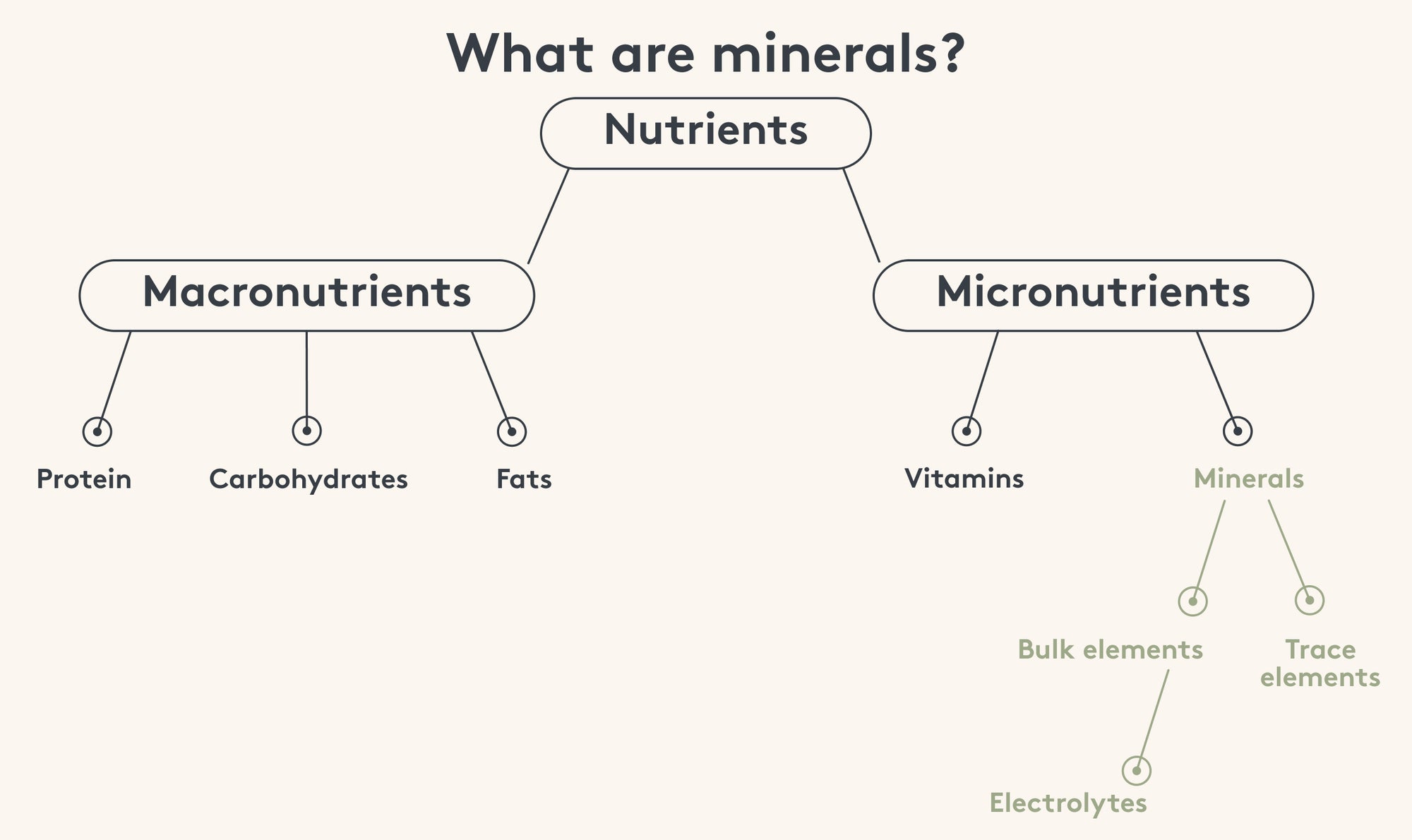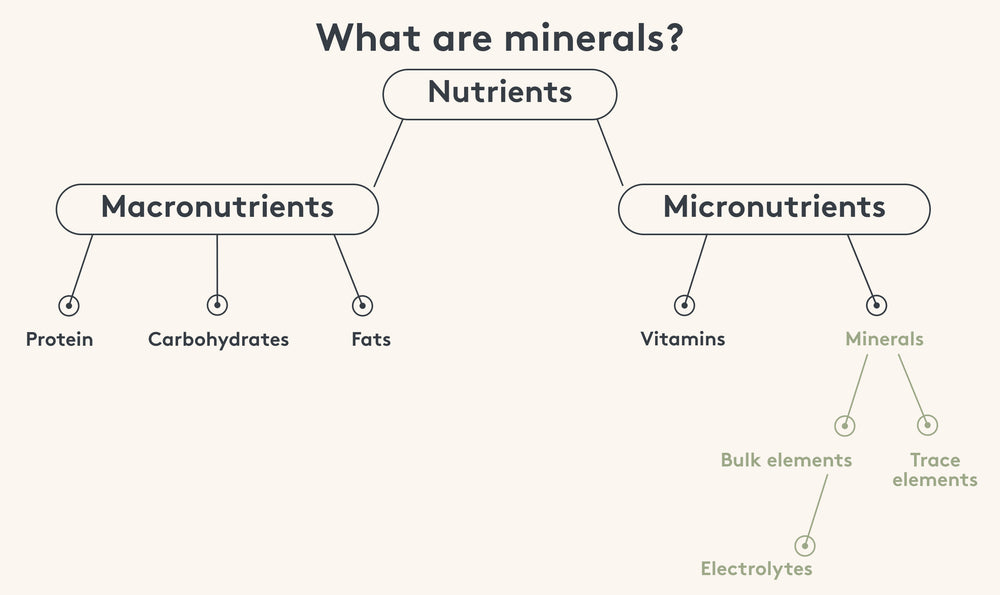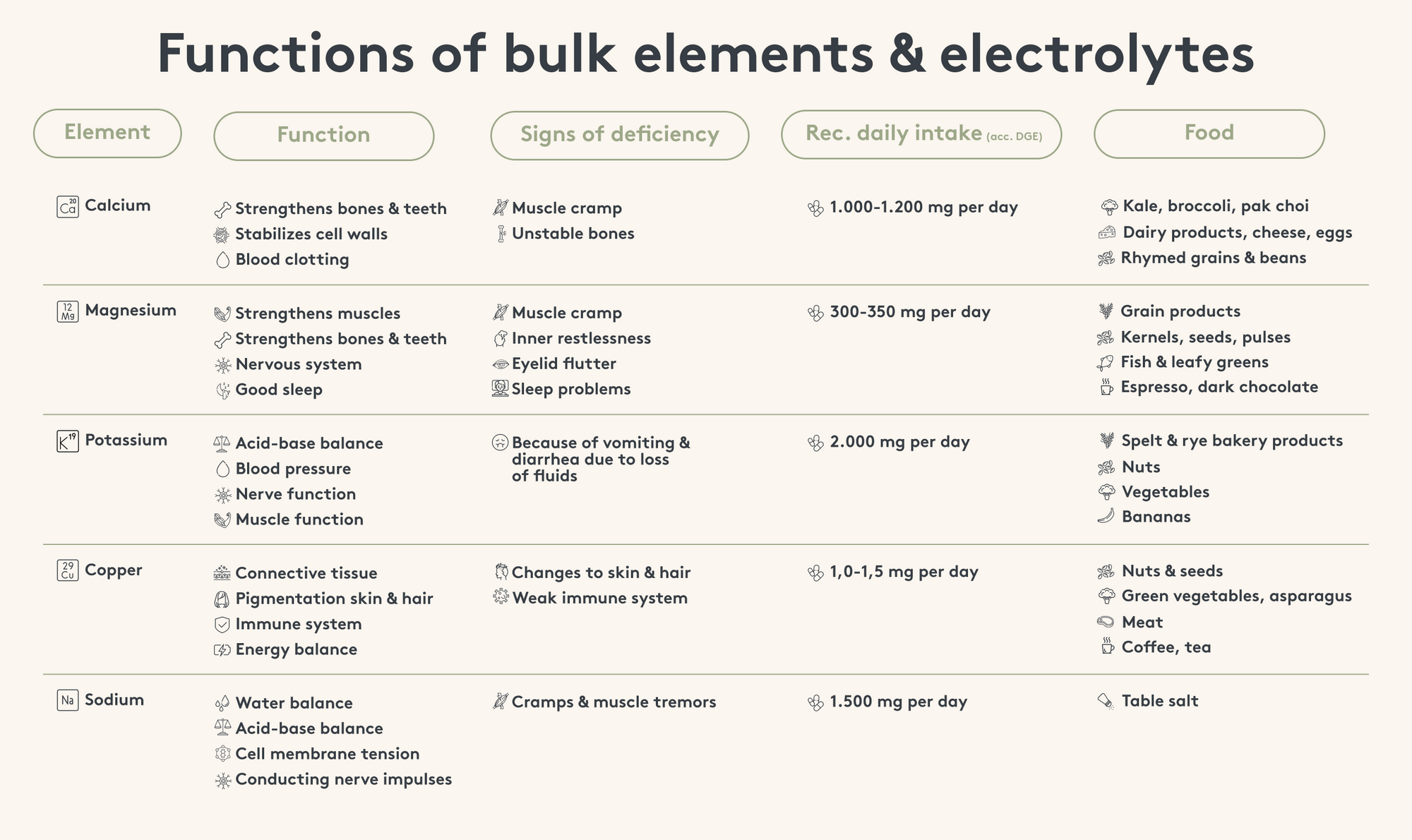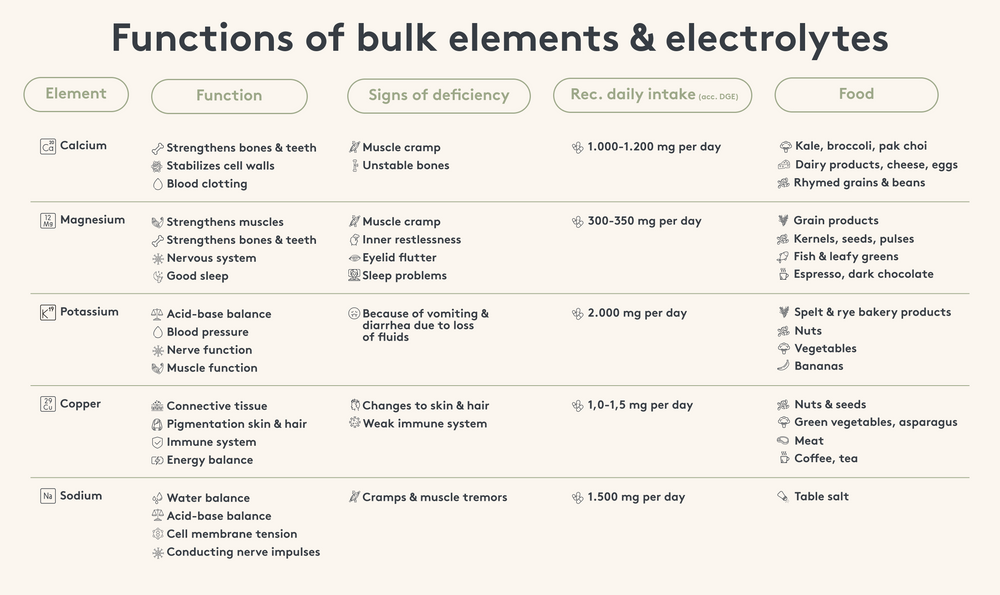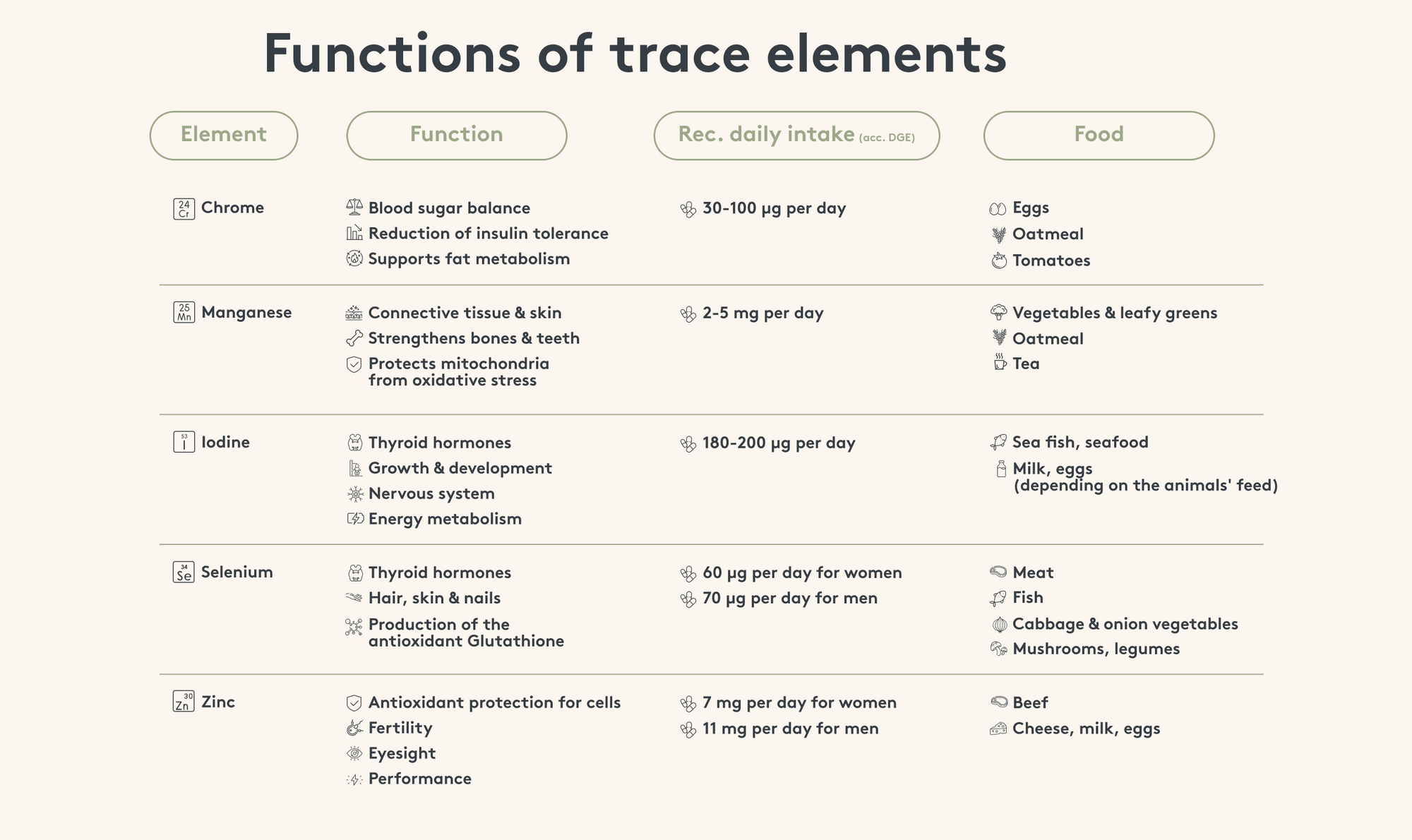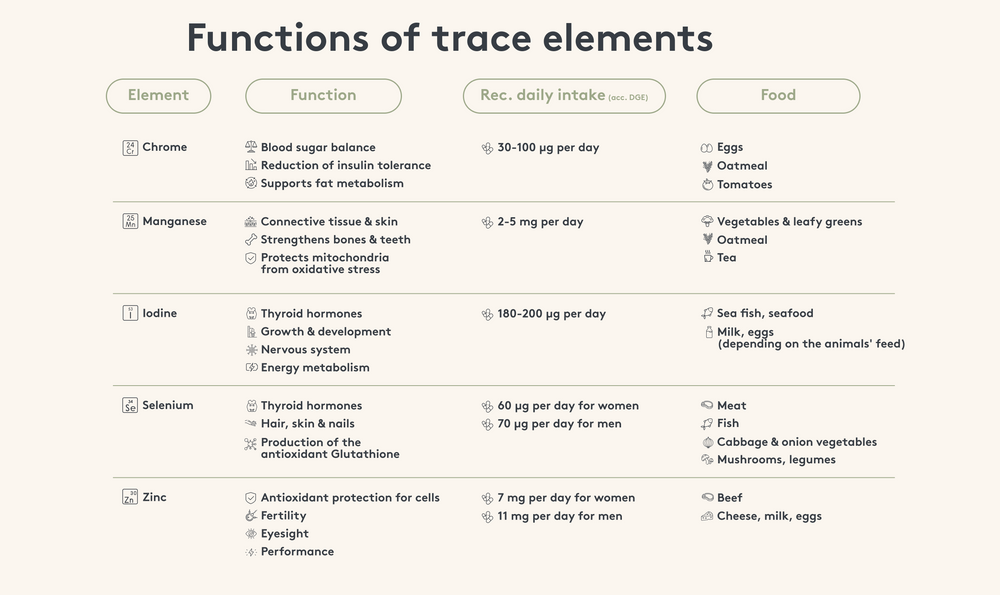Themen dieses Blogartikels:
Table of contents
- What are minerals?
- Your knowledge snack: Macro- vs. micronutrients
- Minerals, trace elements and electrolytes: differences and functions
- Which minerals does your body need?
- Bulk elements and electrolytes
- Calcium
- Magnesium
- Potassium
- Copper
- Sodium
- Trace elements
- Chrome
- Manganese
- Iodine
- Selenium
- Zinc
- How to provide your body with minerals
- Sources & bibliography
What are minerals?
To feel physically and mentally fit and achieve your goals effortlessly, you need nutrients - for example minerals and trace elements. These anorganic substances are found everywhere in nature, for example in the form of salts in the soil and as ingredients in certain foods.
Minerals and trace elements are essential for life. However, the body cannot produce these substances itself or not in sufficient concentration. You therefore need to help by eating a balanced diet. Food supplements also serve as sources of minerals.
Your knowledge snack: Macro- vs. micronutrients
Just like vitamins, minerals are micronutrients. There are also macronutrients. If your body were a car, the macronutrients would be the fuel for your engine. The micronutrients would take on the function of additives and lubricants that ensure the smooth running of the vehicle.
You need both types of nutrients to keep your body's basic functions running smoothly:
- Macronutrients, which include protein, fat and carbohydrates, are important sources of energy.
Your body needs particularly large amounts of these (macro = large). - Micronutrients, on the other hand, are required in smaller quantities
(micro = small) and do not provide energy - but they are also essential as they fulfill important metabolic tasks.
Minerals, trace elements and electrolytes:
differences and functions
The body needs minerals in different quantities. Depending on the concentration of a mineral in the body, a distinction is made between bulk and trace elements. Some minerals are also electrolytes.
To make the whole thing easier to understand, let's take a closer look at the three substances and their importance for your well-being:
- Bulk elements are also called macroelements - because their concentration in the body is at least 50 milligrams per kilogram of body weight (mg/kg).
- Trace elements are also called microelements. These minerals are required in a lower concentration of less than 50 mg/kg. Depending on the element, the quantities are in the microgram range (µg).
- Electrolytes are positively or negatively charged minerals. When dissolved in a liquid such as blood, they can conduct electrical charge.
Good to know
Most minerals are essential for life. However, there are exceptions for trace elements. Chromium, for example, is considered “probably” or “possibly” essential for humans. But even trace elements that are not essential for life fulfill important tasks in the body.
Which minerals does your body need?
As almost all minerals are essential for life, your body needs sufficient amounts of them. Before you pull out your calculator, we can reassure you: According to the German Federal Institute for Risk Assessment (BfR), if you eat a balanced diet, you are automatically giving your body everything it needs.
However, every body has different needs and sometimes requires more or less of certain minerals. You can find out why in the following overview of the most important minerals and their characteristics.
Which minerals does your body need?
Bulk elements and electrolytes
The bulk elements are essential for bones, muscles, the heart and the brain. Many bulk elements are electrolytes that control certain nerve or muscle functions and stabilize the water balance. Electrolytes also keep the acids and bases in your body in balance.
Calcium
Function: Our bones and teeth consist almost 100 percent of the electrolyte calcium (or calcium). Calcium is an important building block for bone density, especially at a young age, and it also plays a role in blood clotting and stabilizing cell walls.
Worth knowing:
- Foods containing calcium include kale, broccoli, dairy products, cheese and eggs. Certain mineral waters also supply your body with calcium.
- The recommended daily dose for adults is 1,000 mg. For adolescents, 1,200 mg is recommended. Symptoms of calcium deficiency include muscle cramps and bone instability.
- In addition to calcium, magnesium is also important for muscles and bones. Athletes who want to benefit from both substances should ensure a balanced ratio in order to achieve the best performance.
Magnesium
Function:
Magnesium is a bulk element that plays an important role for your muscles, bones and teeth and supports your nervous system. The substance also relieves pain and fatigue, contributes to good sleep and activates important enzymes in the energy metabolism.
Interesting facts:
- Magnesium is found in cereal products, kernels and seeds, pulses, fish and leafy vegetables, as well as in espresso and dark chocolate. Caution: Too much caffeine can promote the excretion of the substance via the kidneys.
- The German Nutrition Society's (DGE) estimate for an appropriate daily intake for adults is 300 to 350 mg.
- Magnesium deficiency often manifests itself in muscle cramps, restlessness, fluttering eyelids or sleep problems. It can occur in people whose muscles are under great strain. This applies not only to competitive athletes, but also to pregnant women or menstruating women whose uterine muscles have to perform at their best.2, 3
- Magnesium can be taken in various forms - for example as capsules or as a water-soluble powder. The form depends on how well your body absorbs the substance.
You can find more facts about magnesium in video format on our YouTube channel.
Potassium
Function:
Alongside sodium and chloride, the bulk element potassium is one of the most important electrolytes and therefore a key player in the water and acid-base balance. This substance is mainly found inside cells and contributes to the functioning of blood pressure, muscles and the nervous system.
Interesting facts:
- You can get potassium from nuts, vegetables, bananas and baked goods containing spelt and rye, for example.
- A potassium deficiency can occur if you are ill and lose a lot of fluid through vomiting or diarrhea, causing cramps, among other things.
- For adults, the recommendation is to consume 2,000 mg per day.
Copper
Function:
Copper is mainly found in muscles and bones, which is why it is good for your connective tissue, but also supports the pigmentation of your skin and hair. In addition, your immune system, your energy balance and the balance of your cells benefit from the mineral.
Interesting facts:
- Sources of copper are foods and drinks such as nuts, green vegetables, meat, coffee and tea.
- 1.0 to 1.5 mg is the estimated value for an adequate copper intake per day.
Sodium
Function:
Together with chloride and potassium, the electrolyte sodium takes care of your water balance, your blood pressure and the acid-base balance.
While potassium is mainly found inside the cells, sodium holds the position outside the cells and builds up electrical voltage at the membrane. This is important for transmitting nerve impulses to the heart or muscles.
Interesting facts:
- Sodium is mainly found in table salt, which is used in processed meat products, bread or ready meals, for example.
- Excessive fluid intake dilutes the sodium in the body. If the body also excretes sodium through sweat, for example during sport, the effect is amplified - this can lead to cramps and muscle tremors.
- A drastic loss of fluids during vomiting or sweating without replenishing fluids or excessive salt consumption can promote an excess of sodium and have a negative effect on kidney and muscle function as well as blood pressure.
- For adults, the DGE sets an estimated intake value of 1,500 mg per day.
Trace Elements
These substances are important helpers for enzymes and hormones (cofactors) and support your metabolism. For example, they are involved in carbohydrate metabolism and the formation of bones and teeth, transport oxygen through your bloodstream and support wound healing.
Chrome
Function:
Among other things, chromium is involved in the processing of macronutrients and the secretion of insulin.
Interesting facts:
- The substance is found in eggs, oatmeal and tomatoes, among other things. This form of chromium is called trivalent chromium.
- The recommended daily intake is 30 to 100 µg.
- Chromium helps the body to keep its blood sugar level in the green range. Studies have shown that the substance can potentially help control blood sugar levels in people with type 2 diabetes.1
Manganese
Function:
The essential trace element is good for the nerves and the maintenance of bones and connective tissue. Manganese also helps to defend your cells and mitochondria against oxidative stress - in other words, it prevents an imbalance in the cells caused by free oxygen radicals.
Interesting facts:
- Manganese is found in vegetables, oatmeal, leafy greens and tea.
- The DGE's estimate for an appropriate daily intake is 2 to 5 mg.
Iodine
Function:
Iodine is a vital trace element, as it is involved in the formation of thyroid hormones, among other things. It also helps the energy metabolism, the nervous system and the brain. As iodine also regulates growth, it is particularly important for infants and young children.
Interesting facts:
- The soil in Germany has been low in iodine since the last ice age. It is therefore difficult to get enough iodine from food.
- Foods that contain iodine include sea fish, seafood and, depending on how the animals are fed, milk and eggs.
- Around 30 percent of Germans are affected by iodine deficiency. Symptoms include tiredness and an enlarged thyroid gland. In infants and small children, physical and neuronal developmental disorders can be the result. Excess iodine, on the other hand, is very rare.
- Adequate iodine intake is particularly important during pregnancy and breastfeeding, but also for adolescents and vegetarians and vegans. Supplements are recommended in these cases.
- The recommended daily dose for adults is 180 to 200 µg.
Selenium
Function:
Like iodine, selenium is also involved in the production of thyroid hormones. The trace element is also good for hair and nails, supports the production of the antioxidant glutathione and is a building block of proteins and sperm. It also helps other substances such as manganese to reduce the stress level of your cells.
Interesting facts:
- Important sources of selenium are primarily animal foods such as meat and fish.
- Vegetarians and vegans need to switch to cabbage and onion vegetables, mushrooms or pulses.
- The DGE recommends a daily intake of 60 µg per day for women and 70 µg per day for men.
Zinc
Function:
Zinc is a little all-rounder among the trace elements - it helps around 300 enzymes in the body to do their work. Among other things, the element protects your cells from radicals, is good for your eyesight, fertility, skin, hair and nails and supports your performance.
Interesting facts:
- Beef, cheese, milk and eggs are good sources of zinc.
- In a plant-based diet, nuts and wheat or rye-based products take over the role of zinc source.
- The body's ability to store zinc is limited. This is why dietary intake of this trace element is particularly important.
- How much zinc the body absorbs depends, among other things, on the plant substance phytic acid, which is found in legumes and wholegrain cereals, for example. The substance binds zinc in the gastrointestinal tract and thus inhibits zinc absorption. It can be neutralized by heating or soaking.
- A zinc deficiency can manifest itself in reduced appetite and taste sensation or reduced wound healing.
- The DGE reference value for daily intake is 7 mg for women and 11 mg for men.
Tips for everyday life:
How to provide your body with minerals
A balanced diet automatically replenishes your mineral stores. For certain groups of people, however, it can be helpful to use additional sources for the intake of minerals such as calcium, magnesium, zinc or iodine.
These include, for example
- Competitive athletes
- People with food intolerance
- Patients recovering from an illness
- Vegetarians and vegans
- Pregnant women and their offspring
Important to know
How many minerals your body absorbs depends on various factors. The type of soil in the region where you live changes over time4 and plays its part, as does your lifestyle.
If you live in a region that is particularly low in iodine and love sweaty sports, you need more iodine than people who live by the sea, take it easy and eat fish every day.
Dietary habits and the type of nutrient source also influence the intake of minerals. If you frequently consume processed foods and drink dehydrating substances such as coffee and alcohol, your body may lack important nutrients.
When taking supplements, it is important to take the right dose and choose supplements that have good bioavailability - this means choosing a form of intake that helps the body absorb the substances. It's best to seek advice from your doctor or nutritionist.
Find out more about how MITOcare can help you with your mineral intake.
This article is based on carefully researched sources:
Sources & Bibliography
Sources
- Reference values of the DGE
- Minerals in the MSD Manual
- Mineral information from the food association
- BfR assessment of vitamins and minerals
- Iodine information of the BfR
- Iodine information pages of the Federal Center for Nutrition (BZfE)
- Zinc information from the Society for Nutritional Therapy and Prevention (FET)
- Iodine study by the Federal Office for Food and Agriculture
- Information on nutrient intake reference values from the European Food Safety Authority
Bibliography
- Sharma, S., Agrawal, R. P., Maya Choudhary, M., Shreyans Jain, S., Goyal, S., Agarwal, V.
(2011). Beneficial effect of chromium supplementation on glucose, HbA1C and
lipid variables in individuals with newly onset type-2 diabetes, 3, 25, 149-153. - Reno, A., Green, M., Killen, L., O’Neal, E., Pritchett, K., Hanson, Z. (2022). Effects of Magnesium
Supplementation on Muscle Soreness and Performance. Journal of strength and
conditioning research, 8, 36, 2198-2203. - Parazzini, F., Di Martino, M., Pellegrino, P. (2017). Magnesium in the gynaecological practice:
A literature review. Magnesium Research, 1, 30, 1-7. - Berenice, A., Trenchard, L., Rayns, F. (2021). Historical changes in the mineral content of fruit and vegetables in the UK from 1940 to 2019: a concern for human nutrition and agriculture. International Journal of Food Sciences and Nutrition, 3, 73, 315-326.


